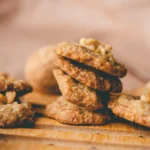Breakfast is often called the most important meal of the day, and what better way to start your morning than with something that’s both healthy and delicious? Breakfast pastries are a classic favorite, but store-bought options are often packed with refined sugar, unhealthy fats, and preservatives. Thankfully, making your own pastries at home allows you to enjoy all the flavor and indulgence without compromising on nutrition.
In this blog post, we’ll explore how to create healthy and flavorful breakfast pastries that you’ll absolutely love. From incorporating whole-grain flours and natural sweeteners to adding fresh fruits and nutrient-dense ingredients, these recipes are designed to satisfy your cravings while supporting your well-being. Whether you’re looking for a quick morning treat or a fun weekend baking project, these ideas will help you whip up pastries that are as good for your body as they are for your taste buds.
What Makes Breakfast Pastries Healthy and Flavorful?
When you think of breakfast pastries, your mind might conjure up images of buttery croissants, sugary danishes, or rich pies—delicious but often lacking in nutrition. However, with a few smart substitutions and ingredient upgrades, you can transform these indulgent treats into nutrient-rich options that are just as flavorful. Here’s how to make your breakfast pastries both healthy and satisfying:
Using Whole-Grain and Nut-Based Flours
Replacing refined white flour with whole-grain options like whole wheat, spelt, or oat flour instantly enhances the nutritional value of your pastries. These flours are rich in fiber, which aids digestion and keeps you full longer, as well as B vitamins and minerals like magnesium. Whole-grain flours also add a nutty flavor that pairs beautifully with both sweet and savory pastries.
For gluten-free or low-carb options, nut-based flours such as almond or coconut flour are excellent alternatives. Almond flour, for example, is packed with healthy fats, protein, and vitamin E, creating pastries that are soft, moist, and full of nutrients.
Incorporating Natural Sweeteners
Traditional pastries rely on processed sugar for sweetness, which can cause energy crashes and provide empty calories. Natural sweeteners like honey, maple syrup, coconut sugar, or mashed dates offer a healthier alternative. These sweeteners not only lower the glycemic impact of your pastries but also add unique flavors. Honey brings floral undertones, maple syrup contributes a caramel-like richness, and dates offer a deep, natural sweetness that enhances baked goods.
Adding Nutrient-Dense Ingredients
The magic of breakfast pastries lies in their adaptability. Incorporating nutrient-rich ingredients such as fresh fruits, nuts, and seeds can elevate both the flavor and the health benefits. Fruits like blueberries, apples, bananas, and raspberries add natural sweetness and a boost of fiber, antioxidants, and vitamins.
Nuts and seeds, such as almonds, walnuts, chia seeds, and flaxseeds, provide heart-healthy omega-3 fatty acids, protein, and a satisfying crunch. Warming spices like cinnamon, nutmeg, and ginger not only enhance the flavor profile but also offer additional health benefits, such as anti-inflammatory and blood sugar-stabilizing properties.
Essential Ingredients for Healthy Breakfast Pastries
To make healthy and flavorful breakfast pastries, it all starts with choosing the right ingredients. By opting for whole, unprocessed options, you can create pastries that are both delicious and nutritious. Here’s a breakdown of the essential ingredients to use:
Whole and Unprocessed Flours
Instead of refined white flour, choose whole grains like whole wheat flour, almond flour, or oat flour. These provide extra fiber, vitamins, and minerals. Whole wheat flour adds a hearty, nutty flavor, while almond flour offers a moist, rich texture that is also gluten-free. Oat flour is mild and adds a subtle sweetness, perfect for a variety of pastries.
Natural Sweeteners
Skip the refined sugar and use natural sweeteners like honey, maple syrup, or coconut sugar. These options are less processed and have a lower glycemic index, helping to stabilize blood sugar levels. Dates also make an excellent sweetener, providing a deep caramel flavor and extra fiber.
Fruits and Vegetables
Adding fresh fruits such as blueberries, raspberries, or apples not only enhances flavor but boosts your pastries with antioxidants, fiber, and vitamins. You can also include vegetables like zucchini or carrots for moisture and subtle sweetness without compromising the flavor.
Healthy Fats
Replace traditional butter or shortening with healthier alternatives like coconut oil, olive oil, or avocado oil. These fats offer heart-healthy benefits while still delivering a tender, flaky texture. Nut butters like almond or cashew butter also add richness and flavor.
Nuts, Seeds, and Spices
Incorporating nuts, seeds, and spices enhances both flavor and nutrition. Almonds, walnuts, chia seeds, and flaxseeds are great additions, offering healthy fats, protein, and fiber. Spices like cinnamon, nutmeg, and ginger elevate the flavor profile and provide health benefits such as anti-inflammatory properties.

Essential Ingredients for Healthy Breakfast Pastries
Creating healthy and flavorful breakfast pastries begins with choosing the right ingredients. By opting for nutrient-dense, whole options, you can ensure that your pastries are both delicious and nourishing. Here’s a breakdown of the essential ingredients:
Whole and Unprocessed Flours
Instead of refined white flour, choose whole wheat, almond, or oat flour. Whole wheat flour is high in fiber, helping digestion and providing sustained energy. Almond flour is gluten-free, rich in healthy fats, and offers a moist texture, while oat flour is mild and adds natural sweetness.
Natural Sweeteners
Skip refined sugar and use natural sweeteners like honey, maple syrup, or coconut sugar. These options are lower on the glycemic index, offering a steadier release of energy. Dates also provide rich sweetness and extra fiber, making them a great natural alternative.
Fruits and Vegetables
Incorporating fresh fruits like blueberries, apples, and bananas adds vitamins, antioxidants, and fiber to your pastries. Vegetables like carrots and zucchini add moisture and subtle sweetness without overpowering the flavor.
Healthy Fats
Replace butter or shortening with healthier fats like coconut oil, olive oil, or avocado oil. These fats contribute to a tender, flaky texture and offer heart-healthy benefits. Nut butters, such as almond or cashew butter, can add richness and flavor.
Nuts, Seeds, and Spices
Nuts like almonds and walnuts, along with seeds such as chia and flax, provide healthy fats, protein, and fiber. Spices like cinnamon, ginger, and nutmeg enhance flavor while offering anti-inflammatory and blood sugar-stabilizing benefits.
Top Healthy Breakfast Pastry Ideas to Try
You don’t have to sacrifice health for flavor when it comes to breakfast pastries. By using wholesome ingredients, you can create delicious treats that are both nutritious and satisfying. Here are some top healthy breakfast pastry ideas to inspire your morning baking:
1. Whole Wheat Apple Cinnamon Rolls
These rolls use whole wheat flour and maple syrup, replacing refined sugars. Add diced apples for extra flavor and fiber, while cinnamon provides a warm, comforting spice. A great way to enjoy a sweet pastry that’s still healthy!
2. Banana Oat Muffins
These muffins are naturally sweetened with ripe bananas and packed with oats for extra fiber. Add walnuts or chia seeds for healthy fats and protein, making them perfect for a busy morning or afternoon snack.
3. Almond Flour Scones
Gluten-free and made with almond flour, these scones are moist and rich. Add berries like raspberries or blueberries to boost antioxidants, and sweeten with a bit of honey or maple syrup for a naturally sweet treat.
4. Zucchini Bread with Walnuts
Incorporating zucchini into bread adds moisture and nutrients. Use whole wheat flour and honey to create a healthier version of this classic. Walnuts provide a crunchy texture and healthy fats, making it a satisfying breakfast option.
5. Sweet Potato Breakfast Biscuits
These biscuits are made with sweet potatoes, which are rich in vitamins and fiber. Pair with a bit of almond butter or fresh fruit for a balanced, nutritious breakfast.
6. Carrot Cake Energy Bars
Made with oats, grated carrots, and natural sweeteners, these energy bars are a convenient, nutritious breakfast or snack. Add nuts for a crunchy texture and extra protein.
These healthy pastry ideas are easy to make and perfect for starting your day with flavor and nutrition!
Tips for Baking Perfect Healthy Pastries at Home
Baking healthy pastries at home allows you to enjoy delicious treats without compromising on nutrition. To ensure your pastries turn out perfect every time, follow these simple tips:
1. Use Whole Grain or Alternative Flours
Opt for whole wheat flour, almond flour, or oat flour to add fiber and nutrients to your pastries. These flours make your treats healthier while still providing great flavor. You may need to adjust the liquid content in your recipes when using whole grain flours, as they absorb more moisture.
2. Measure Ingredients Accurately
Accurate measurements are key to getting the right texture in your pastries. Too much flour or too little liquid can make them dry or dense. Always measure dry and wet ingredients separately and level off the flour for precise results.
3. Choose Healthy Fats
Replace butter with healthier fats like olive oil, coconut oil, or avocado oil. These oils provide moisture and healthier fat content. Nut butters like almond or cashew butter can also add richness and flavor.
4. Don’t Overmix the Dough
When preparing pastry dough, mix just until the ingredients are combined. Overmixing can make the dough tough. If your recipe calls for cold butter, make sure to leave small, pea-sized pieces for a flakier texture.
5. Rest the Dough
Let your dough rest in the refrigerator for at least 30 minutes. This step helps the fat firm up, making the dough easier to handle and resulting in a flakier pastry.
By following these tips, you’ll be able to bake healthier pastries that taste just as delicious as their traditional counterparts, all while boosting their nutritional value.
Why Choose Homemade Breakfast Pastries?
Making your own breakfast pastries offers numerous benefits, from better control over ingredients to enjoying fresher, tastier treats. Here are some reasons why you should choose homemade over store-bought:
1. Control Over Ingredients
When you bake at home, you know exactly what goes into your pastries. You can use whole grains, natural sweeteners, and healthier fats, ensuring that your treats are free from artificial additives, preservatives, and excess sugar. This way, you can make your pastries as wholesome as possible.
2. Tailored to Your Dietary Needs
Homemade pastries give you the flexibility to adjust the recipe to suit your dietary preferences. Whether you’re gluten-free, vegan, or following a low-sugar diet, you can easily swap out ingredients. For instance, almond flour can replace wheat flour, and plant-based oils can replace butter.
3. Freshness and Flavor
Freshly baked pastries offer unmatched flavor and texture. Unlike store-bought varieties that may sit on shelves for days, homemade pastries are best enjoyed fresh from the oven, delivering a superior taste and aroma that can’t be replicated.
4. Reduce Sugar and Unhealthy Fats
Store-bought pastries are often loaded with refined sugars and unhealthy fats. By baking at home, you can significantly cut down on sugar and replace harmful fats with healthier alternatives like coconut oil or olive oil.
5. Cost-Effective
Making your own pastries can be more affordable than buying pre-packaged ones, especially when you buy ingredients in bulk. Plus, the cost per serving is often much lower, and you can create large batches for the whole family.
Making your own breakfast pastries offers numerous benefits, including better control over ingredients, customization to fit dietary needs, and the enjoyment of fresher, tastier treats. For more insights into the advantages of homemade baked goods, you might find this article helpful:

Homemade breakfast pastries are not only a delicious treat but also a healthier and more rewarding choice. By baking your own pastries, you gain full control over the ingredients, allowing you to customize them to suit your dietary preferences and health goals. Whether you opt for whole grains, natural sweeteners, or healthier fats, homemade pastries are a great way to start your day with a nourishing, flavorful bite.
Additionally, making your own pastries ensures they are fresh, free from artificial additives, and made with love, offering a satisfying and guilt-free indulgence. Plus, the ability to experiment with new flavors and ingredients makes baking at home an exciting and creative process.
So, next time you crave a breakfast pastry, consider the many benefits of going homemade. It’s not just about making a healthier choice—it’s about enjoying the process, knowing exactly what goes into your food, and reaping the rewards of fresh, flavorful pastries that support your well-being. Happy baking!









